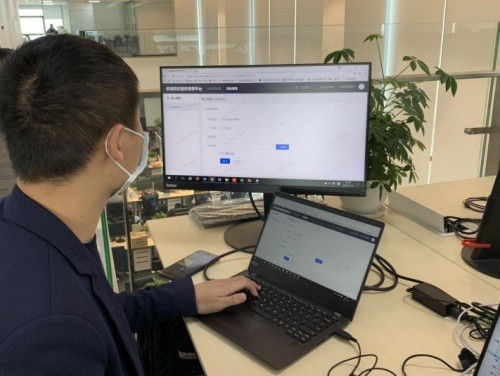In an effort to curb the COVID-19 outbreak, the Wuhan Municipal Government instructed its local epidemic prevention personnel to screen suspected cases by making daily phone calls to gather information such as symptoms and body temperature of residents. However, human operators cannot complete more than 300 phone screenings a day. The efficiency and accuracy of such calls can also vary, depending on the operator's experience and judgement.
To help solve this challenge, Ping An Smart Healthcare launched on February 18 a smart audio screening system for COVID-19 to strengthen epidemic control and prevention with artificial intelligence (AI) technology. Ping An Smart Healthcare is a subsidiary Ping An International Smart City Technology under the Ping An Insurance Group.
To date, the smart audio screening system has completed over 580,000 screenings in 47,000 households in 17 communities in Wuhan, and successfully identified more than 1,600 suspected cases for tracking.
"Preventing and controlling an epidemic is like racing with the virus. Ping An's COVID-19 smart audio screening system can effectively strengthen the ability to prevent and control the epidemic, resulting in higher efficiency and smarter management. As a result, epidemic prevention personnel can focus their time and efforts on more important tasks," said Geoff Kau, Co-President and Chief Strategy Officer of Ping An Smart City.
Putting AI robots to work
The smart audio screening system has capacity for up to 3,000 AI robots working at the same time. Each AI robot can handle up to 500 auto call screenings per day, a total of 1.5 million daily. On launch day, the system screened more than 1,200 households in Wuhan, categorising and reporting information such as body temperature and symptoms to the related authority. It took five minutes in total to complete all the 1,200 calls including second attempts in case they failed in their first attempts.
Ping An's COVID-19 system applies one of the most sophisticated technologies in AI, Natural Language Processing Technology (NLP). The system can activate automated dialogue according to programmed questions, understand the semantic meaning of the conversation, structure and categorise the results for risk assessment, and report to the epidemic prevention and control management team, who can then accurately track the residents with suspected symptoms.
The smart audio screening system is one of two new systems that Ping An Smart Healthcare developed as the COVID-19 epidemic in Wuhan reached a critical stage. While the smart audio screening system helped in the triage of COVID-19 patients, the smart image-reading system helps medical frontliners in the early detection of the diseases by allowing radiologist to read CT-scan images taken from patients. The system can generate smart analysis results in around 15 seconds, with an accuracy rate above 90%.
Also released in February, the AI-based smart-image reading system image has provided services to more than 1,500 medical institutions. More than 5,000 patients have received smart image-reading services for free.



